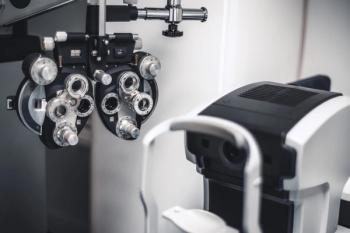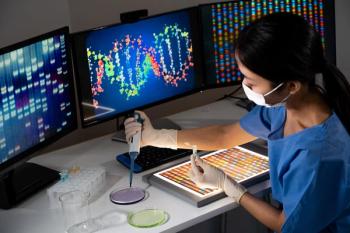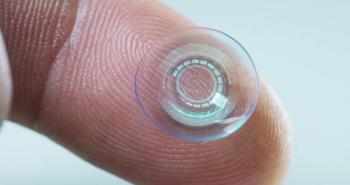
AAOpt 2024: Investigating the performance of a 30-day toric lens for patients with heavy digital device use
Dr. Andrew Pucker presented data on the performance of toric lenses under the stress of heavy digital device use at the 2024 American Academy of Optometry meeting in Indianapolis.
In today's world, where many patients are spending over eight hours a day in front of digital screens, finding contact lenses that cater to these needs is increasingly important. A recent study presented at the 2024 American Academy of Optometry meeting by Andrew Pucker, Executive Director of Clinical and Medical Science at Lexitas Pharma Services, provides promising insights into how modern contact lenses, like the Total30 toric lenses (Alcon), perform for heavy digital device users.
The study focused on existing contact lens wearers with astigmatism and assessed their experience using the Total30 lens over the course of one month. The goal was to determine how these lenses perform under the conditions of extensive screen use—a common scenario for many patients today.
Comfort and performance: Key findings
The study showed overwhelmingly positive results, with patients reporting stable and sustained comfort throughout the day, even with extended screen time. While there was a slight decrease in comfort as the day progressed—a common issue with any contact lens—the overall comfort level remained consistent from baseline to one month of wear. Notably, this slight decrease in comfort did not reach a level that would be considered uncomfortable for most users.
Across multiple time points (baseline, one week, and one month), patient comfort was stable, both at the start and end of the wear day. These findings suggest that the Total30 toric lenses are a reliable choice for digital device users who need all-day comfort.
Digital eye strain and quality of life
An important concern for many contact lens wearers who use digital devices extensively is digital eye strain (DES). The study measured this using a validated survey and found minimal reports of digital eye strain among participants. In fact, the lenses did not appear to exacerbate symptoms typically associated with prolonged screen use. This aligns with previous research suggesting that wearing contact lenses does not necessarily worsen digital eye strain, despite concerns that lenses could disrupt the tear film and lead to discomfort or dryness.
Additionally, participants reported a good quality of life while wearing Total30 toric lenses, which is essential for patients who need a lens that supports both their vision and daily activities.
A strong option for astigmatism and digital device users
For optometrists looking for a contact lens that meets the needs of patients with astigmatism and heavy digital device use, the Total30 toric lens offers a compelling option. Not only does it provide stable comfort and support minimal digital eye strain, but its performance over a month suggests it can handle the demands of modern life. Given the increasing prevalence of screen time, this lens could be a great solution for patients looking to balance their vision correction with their digital lifestyles.
Newsletter
Want more insights like this? Subscribe to Optometry Times and get clinical pearls and practice tips delivered straight to your inbox.















































